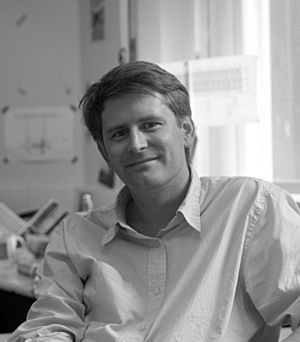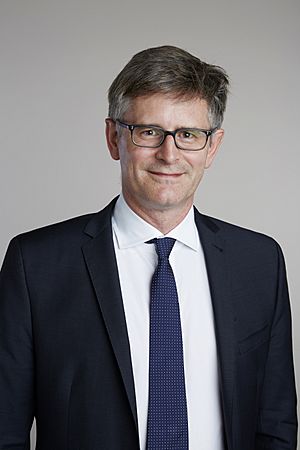Michael Hausser facts for kids
Quick facts for kids
Michael Häusser
FRS FMedSci
|
|
|---|---|

Häusser in 2005
|
|
| Born |
Michael A. Häusser
|
| Alma mater | University of Oxford |
| Awards |
|
| Scientific career | |
| Fields |
|
| Institutions |
|
| Thesis | Intrinsic properties and sympatic inhibition of substantia nigra neurones (1992) |
| Doctoral advisor | Julian Jack |
Michael A. Häusser is a British scientist. He is a professor of Neuroscience at University College London (UCL). He works at the UCL Wolfson Institute for Biomedical Research. Professor Häusser studies how our brains work.
Contents
Learning and Education
Michael Häusser studied at the University of Oxford. In 1992, he earned his DPhil degree, which is like a very advanced master's degree. His research focused on special brain cells called neurons. These neurons are found in a part of the brain called the substantia nigra. His supervisor was James Julian Bennett Jack.
Exploring the Brain
Professor Häusser's work is all about neuroscience. This field explores how the brain and nervous system function. He is very interested in dendrites. Dendrites are tiny, branch-like parts of neurons that receive signals from other neurons.
He also studies biological neural networks. These are like the complex wiring systems in our brains. He looks at how these networks help us think, learn, and behave. His research helps us understand how the brain processes information.
Special Awards and Honors
Professor Häusser has received important awards for his scientific work.
Royal Society Fellowship
In 2015, he was chosen as a Fellow of the Royal Society (FRS). This is a very high honor for scientists in the United Kingdom. It means he is recognized for making major discoveries.
His election certificate said that he helped us understand how the complex parts of nerve cells, called dendrites, help the brain do its important calculations. He used new methods and careful analysis to show how these tiny parts of brain cells help with learning and how the brain changes over time.
Academy of Medical Sciences
In 2012, Professor Häusser also became a Fellow of the Academy of Medical Sciences (FMedSci). This award recognizes his important contributions to medical science.
 | Percy Lavon Julian |
 | Katherine Johnson |
 | George Washington Carver |
 | Annie Easley |


